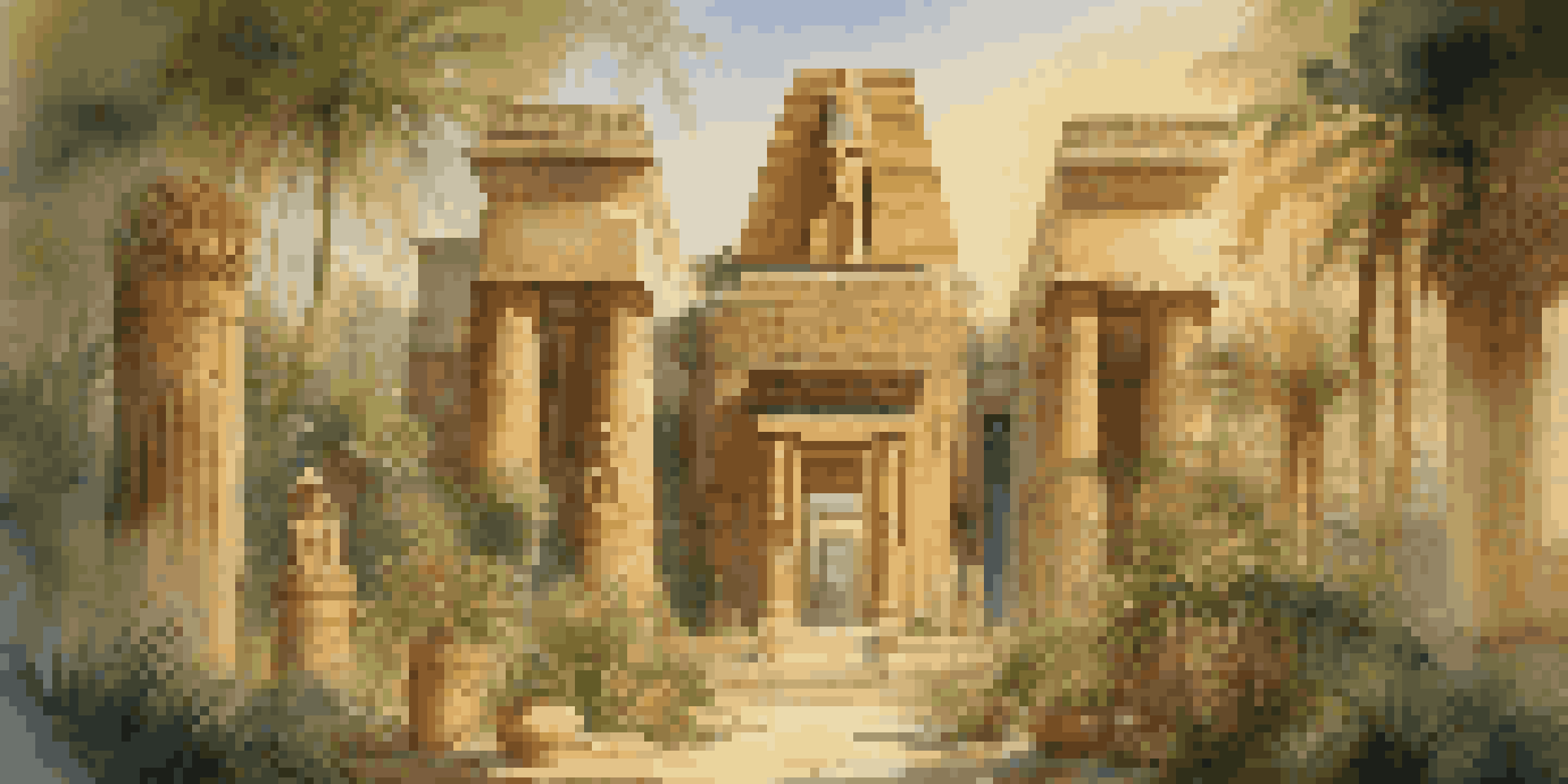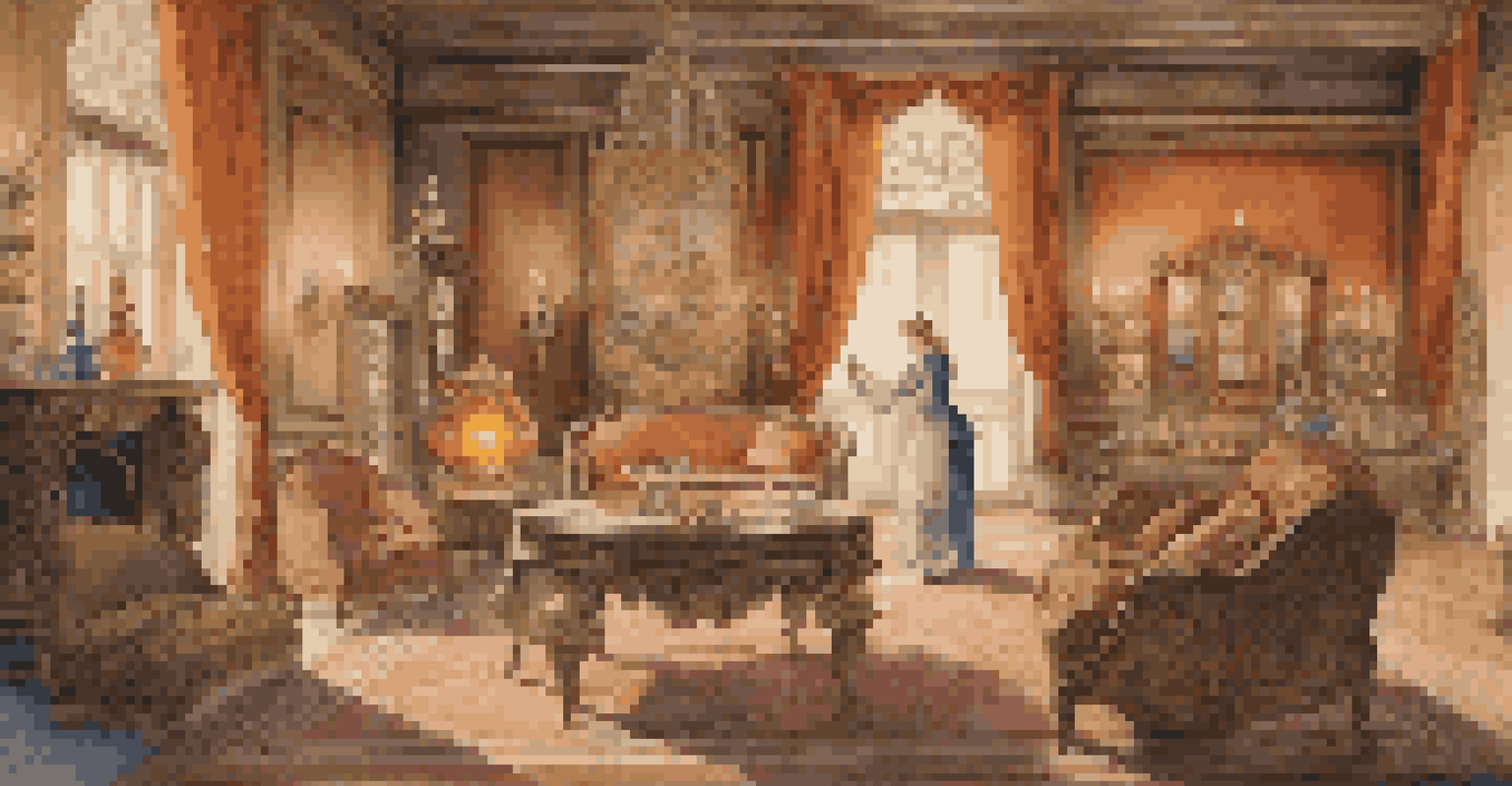The Evolution of Luxury Home Fragrance Over the Decades

The Beginnings: Fragrance in Ancient Civilizations
In ancient civilizations, fragrances were not just for pleasure; they had profound cultural significance. Egyptians used incense in rituals, believing it connected them with the divine. Similarly, in ancient Rome, scented oils were popular among the elite, showcasing their wealth and status.
Perfume is the most intense form of memory.
These early practices laid the groundwork for luxury home fragrances, intertwining scent with spirituality and social standing. The use of natural ingredients like myrrh and frankincense highlighted the importance of scent in daily life. This connection to nature became a cornerstone for the development of more sophisticated fragrances in later centuries.
As trade routes expanded, so did the availability of diverse aromatic materials, setting the stage for the evolution of luxury fragrances. The desire for unique scents became a symbol of refinement, paving the way for the lavish home fragrances we see today.
The Renaissance: A Blooming Interest in Scent
The Renaissance sparked a renewed interest in the arts, and fragrance was no exception. Perfume-making evolved into a respected craft, with artisans creating exquisite blends for nobility. Wealthy families began to fill their homes with luxurious scents, making it a status symbol.

During this period, the introduction of alcohol-based perfumes allowed for more complex scent profiles. Aromatic botanicals and spices from the East became highly sought after, adding layers of depth to home fragrances. This era marked a significant shift as fragrances transitioned from personal use to home ambiance.
Fragrance's Cultural Significance
Fragrances have deep cultural roots, serving as symbols of spirituality and social standing throughout history.
As society became more enamored with aesthetics and atmosphere, the concept of luxury home fragrance began to take shape. The Renaissance set the stage for future innovations, blending art and science to create unforgettable olfactory experiences.
The 19th Century: Industrialization and Innovation
The 19th century brought about the Industrial Revolution, transforming many aspects of life, including fragrance. Mass production made scents more accessible, allowing the middle class to indulge in home fragrances once reserved for the elite. This democratization of luxury sparked a new wave of creativity in scent formulation.
Fragrance is a story that the nose tells the heart.
As technology advanced, so did the methods of extraction and blending essential oils. Synthetic ingredients also began to emerge, giving perfumers more freedom to experiment without relying solely on natural resources. This period saw the rise of iconic brands that would lay the groundwork for modern luxury fragrances.
The combination of industrialization and innovation led to a booming fragrance market. Home fragrances became increasingly popular, with candles and diffusers emerging as essential decor items to enhance personal spaces.
The 20th Century: The Age of Iconic Fragrances
The 20th century was a golden age for fragrance, marked by iconic launches that changed the landscape. Brands like Chanel introduced signature scents that became synonymous with luxury and style. This era saw the rise of celebrity endorsements, which elevated fragrance into a cultural phenomenon.
With advancements in marketing and packaging, luxury home fragrances began to tell a story. Consumers were drawn not just to the scent, but to the lifestyle it represented. This shift laid the groundwork for home fragrances as an integral part of home decor and personal expression.
Rise of Personalized Fragrances
The luxury fragrance industry is shifting towards personalization, allowing consumers to create unique scents that reflect their individual tastes.
As more people began to appreciate the emotional impact of scent, luxury fragrances became a way to curate experiences at home. The concept of creating a 'scented sanctuary' emerged, further intertwining luxury with personal well-being.
The 21st Century: Sustainable and Personalized Fragrances
In recent years, the luxury fragrance industry has seen a significant shift toward sustainability. Consumers are increasingly mindful of the ingredients in their home fragrances, leading brands to focus on eco-friendly practices. This change reflects a broader societal trend towards conscious consumption.
Personalization has also become a key theme in the luxury fragrance market. Brands now offer customizable options, allowing consumers to create unique blends that resonate with their individual tastes. This trend empowers consumers and fosters a deeper connection to the scents they choose for their homes.
As technology continues to advance, we can expect even more innovation in the luxury home fragrance space. From smart diffusers to tailored scent experiences, the future of fragrance is bright, and it promises to enhance our living spaces like never before.
The Global Influence of Fragrance Culture
Luxury home fragrance is not confined to one culture; it has evolved globally, influenced by diverse traditions and practices. From the incense of Japanese temples to the floral scents of Indian festivals, each culture brings its unique perspective on fragrance. This blending creates a rich tapestry of olfactory experiences.
As global travel and cultural exchange become more prevalent, luxury home fragrances are increasingly inspired by international scents. Consumers are now able to experience fragrances that reflect the essence of different cultures, making their living spaces feel more connected to the world.
Sustainability in Fragrance Trends
Recent trends highlight a growing emphasis on sustainability, with consumers preferring eco-friendly ingredients in home fragrances.
This global influence enriches the fragrance market, prompting brands to create collections that celebrate cultural heritage. The result is a diverse array of scents that resonate with consumers on multiple levels, enhancing the luxurious experience of home fragrance.
The Future: Trends Shaping Luxury Home Fragrance
Looking ahead, the luxury home fragrance industry is poised for exciting developments. Trends like aromatherapy and wellness are gaining traction, with consumers seeking scents that promote relaxation and mindfulness. This shift emphasizes the emotional and psychological benefits of fragrance in our daily lives.
Additionally, the rise of technology in fragrance delivery systems is changing the way we experience scents at home. Innovations such as app-controlled diffusers and smart candles are making it easier to curate personalized olfactory atmospheres.

As we move forward, we can expect luxury home fragrances to continue evolving, merging tradition with modernity. The focus will likely remain on sustainability and personalization, ensuring that fragrance remains an essential part of enhancing our living spaces.